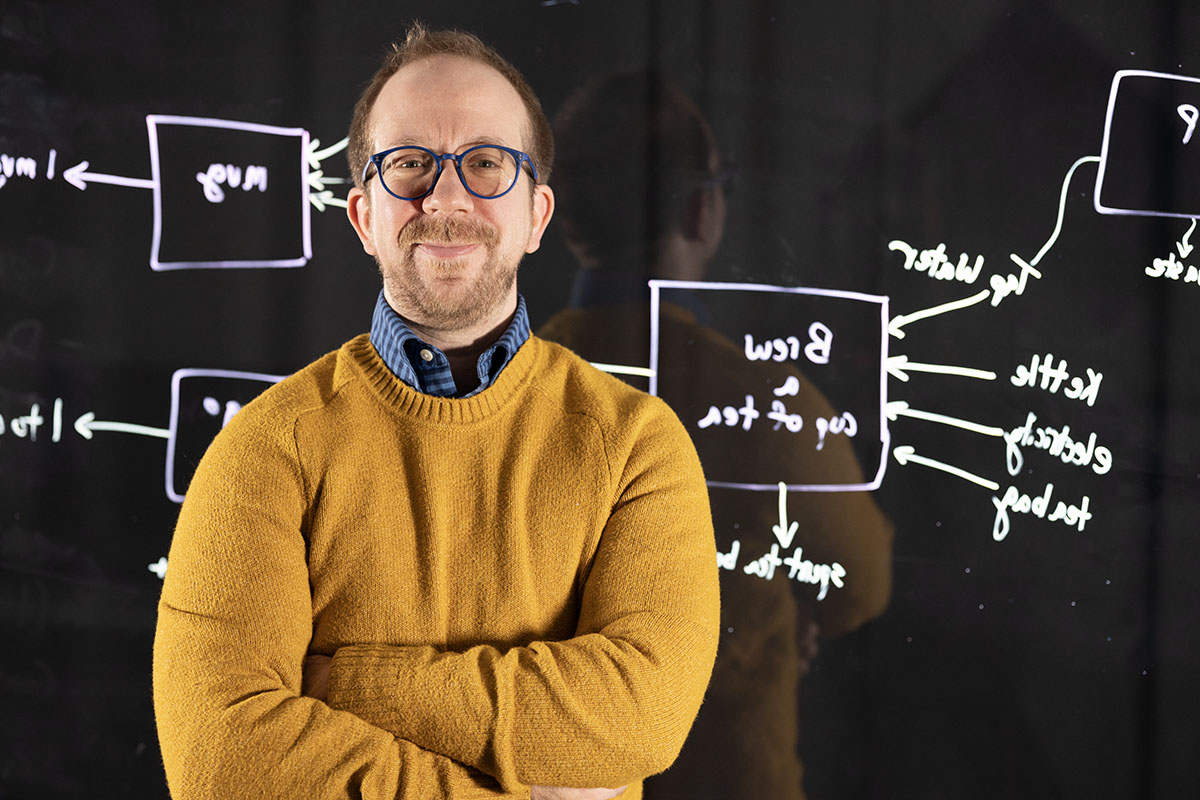
UMaine’s Dr. Reed Miller Tackles Sustainability Challenges
Dr. Reed Miller, assistant professor of civil and environmental engineering is advancing research to reduce the environmental impacts of industrial systems. His work focuses on developing circular economy strategies that minimize waste, optimize resource efficiency, and address sustainability challenges.
Miller’s research employs tools such as life cycle assessment, material flow analysis, and environmentally extended input-output analysis to track material use and pollution flows, identify inefficiencies, and propose solutions for more sustainable industrial processes. His projects, often supported by federal agencies and industry partners, have addressed issues ranging from e-waste management and alternative jet fuels to decarbonizing infrastructure materials.
One of Miller’s key research areas involves assessing the environmental impacts of fiber-reinforced polymer composites and thermoplastic rebar, materials that could significantly enhance the durability and sustainability of infrastructure. Supported by the Transportation Infrastructure Durability Center, his work focuses on refining models to better measure carbon footprints and identify emission-reduction opportunities in global supply chains.
Miller’s collaborations span the Advanced Structures and Composites Center at UMaine, Oak Ridge National Laboratory, and international partners in China, Canada, and Peru. His interdisciplinary projects integrate engineering, policy, and social sciences to tackle complex challenges such as recycling wind turbine blades and evaluating PFAS treatment technologies.
Beyond his research, Miller is dedicated to mentoring the next generation of engineers. His graduate students are working on projects including freight transport modeling, the environmental impacts of composites, and decision-support tools for policymakers.
Miller holds degrees in Environmental Engineering, bachelor’s from the University at Buffalo, master’s from MIT, and PhD from Yale University and a master’s in Technology and Policy from MIT. Since graduate school, he has focused on assessing the sustainability of industrial and commercial systems
Through his research, teaching, and global collaborations, Miller exemplifies UMaine’s mission to lead in sustainability-focused engineering, paving the way for more resilient and resource-efficient industrial systems.
What are some of your proudest achievements or milestones in your research career?
At UMaine, our team winning the Wind Turbine Materials Recycling Prize has been an important highlight. End-of-life wind turbine blades are going to be an increasingly critical waste management issue, and I’m looking forward to expanding on our successful prototypes to make the process a commercial success.
Prior to joining UMaine, I’m most proud of three achievements while at Yale. 1) The release of the novel Global Commons Stewardship Index and 2) the publication of innovative work on the USEEIO model demonstrated my newfound ability to creatively apply EEIO methods to inform environmental decision-making. 3) The work on LCA of hydrogen-fueled aircraft required me to compile data and models from a variety of disciplines (e.g. physics, aerospace engineering, and climate science) due to the complexities of emissions at high altitudes, such as contrail cirrus formation. I subsequently co-authored a chapter of a report aimed at information airline industry contrail policy. Methods from the field of IE can be applied to any sector of the global economy, and success in work like this has given me confidence to support my graduate students in studying new sectors. Additional accomplishments include Global Commons Stewardship Index and life cycle impacts of jets fueled by liquid hydrogen.
What challenges do you foresee in your research, and how do you plan to address them?
There’s a bit of a challenge in attempting to train graduate students in IE methods who are working on rather distinct product systems (e.g. composite bridges and wood fiber insulation). While the overall methods are generally applicable, the nuance comes in gathering data and developing models to reflect the specific supply chains and life cycle patterns of each product system. Fortunately, I will be hiring a postdoctoral associate with expertise in LCA starting this summer to support the research and mentorship of the growing research group.
What impact do you hope your research will have in the next 5–10 years?
My overall goal is to support the creation of research that will guide decisions towards technologies and systems that are radically less impactful on the environment. Through publications and partnerships, I hope to impact the direction of several industrial systems in Maine and beyond.
At UMaine, I hope to create training and tools that will facilitate integration of life cycle thinking and analysis into technology design.
What motivates you to keep exploring and innovating in your field?
The current pace of change in our production and consumption systems is insufficient to meet global targets for environmental sustainability. I’m aware that by acting alone, I can only have a small impact, but the combined effect of collaborating, publishing innovative and transparent research, and training cohorts of IE experts can be powerful.
What advice would you give to someone aspiring to follow a similar path?
Contact: Taylor Ward, taylor.ward@maine.edu
